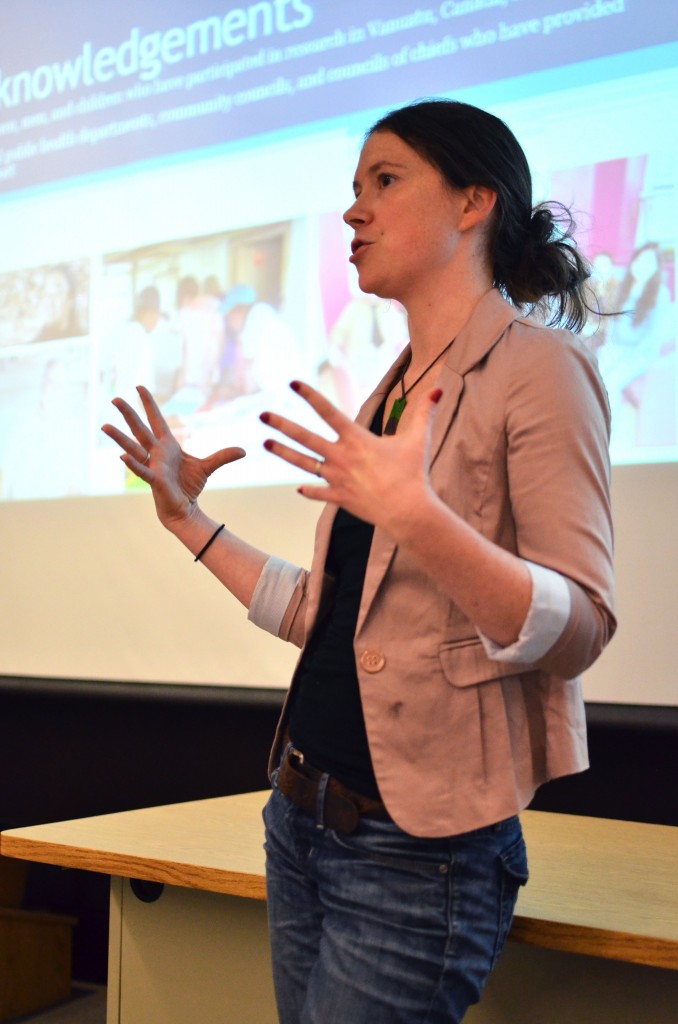
Every chair was filled as students, members of the anthropology department and other faculty filed in to listen to the Evolutionary Studies (EvoS) talk, ”Obesity Begins Before Birth?” given by Kelsey Dancause Monday evening in Academic A.
Dancause is a professor of kinanthropology, which is a combination of kinesiology, or the study of physical activity and human movement, and anthropology, at the University of Quebec in Montreal, Canada.
Her study followed infants from birth until adolescence, and studied how poor nutrition and stress during pregnancy can increase the risk of obesity in children.
Dancause was recommended to EvoS coordinator Hadassah Head by a Binghamton University student who had previously worked with her. Head was looking for an expert who could speak about nutrition. She said that the talk was intended to introduce students to the idea that food is one of the fundamental components to evolution, and to get students to think about nutrition as a global issue.
According to Dancause, obesity is everywhere, and policymakers are responsible for preventing it by providing resources like therapy and education for pregnant women.
“To me, if we see effects of prenatal stress in an affluent population like Canada or the U.S., can you imagine the effects of the stress among women living in poverty?” Dancause said.
According to Dancause, a pregnant woman’s environment has life-long health implications for her child, including smaller infant size at birth, a greater risk of obesity and insulin resistance, which can lead to diabetes.
Prenatal stress and nutrition can also affect behavioral, cognitive and motor development, she said. This includes slightly delayed linguistic development and motor development, and a slightly lower IQ.
Dancause said that professionals from across disciplines should work together to study and fight obesity.
“The main message is that infectious diseases, maternal nutrition and non-communicable diseases like obesity are all linked,” Dancause said. “Typically, we study them separately and interventions are sort of separate but they’re so intertwined. We really need strong collaborations in research and in public health.”
Dancause discussed her studies measuring stress due to natural disasters, which she said are useful models because they are not dependent upon the mother’s genetics, education or other demographics. She looked at three natural disasters: the 1998 ice storm in Quebec, the Iowa flood of 2008 and a flood in Queensland, Australia in 2011.
During her study, she used surveys to measure stress, including questions regarding how many days women were without electricity, how many times they had to move and how much money they lost from the damage done to their homes after the disaster.
Joseline Cruz, a senior majoring in biology, said that Duncause’s work was important because most people do not understand the effects of stress and prenatal nutrition on a child long after birth.
“Nutrition is so important during pregnancy and the fact that it’s exemplified in developing countries further stresses that organizations like the [United Nations] have to put more effort into trying to decrease poverty, and in turn, that would affect malnutrition,” Cruz said. “I think it’s beneficial, it was interesting to have a new angle to look at nutrition from.”
Dancause said that initially, she felt her topic would be too different from the focus of EVoS to interest students, but David Sloan Wilson, EVoS director, said that it was still relevant.
“It was a beautiful talk and not at all removed from evolutionary studies,” Wilson said. “Evolutionary study is written all over that.”


